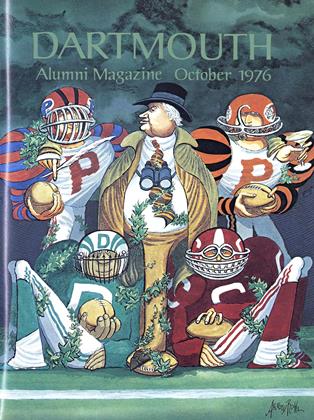As Roger Hull states in the final chapter of The Irish Triangle, in Ulster issues of law and order as well as of freedom and justice have been "debated by bullets and words for longer than anyone cares to remember." Why, then, still another book?
Both the unusual discussion format and the quality of the argumentation of issues in TheIrish Triangle are adequate justification for publication of another 300-page debate on the Irish Question.
A more accurate title for this book might have been "The Irish Quadrangle." Hull's prime intention seems to be to provide an international legal perspective on the current conflict in Northern Ireland, thereby broadening the conventional view of the struggle as a threeparty (Dublin-Belfast-London) problem. Other than analyzing the actions of the participants, Hull's pivotal concern is to suggest how the community of international law, which is rooted in the Geneva Conventions, the European Convention, and the Universal Declaration of Human Rights, might be used as a humanitarian, intervening "fourth party."
Hull starts with a succinct summary of British-Irish relations from 1172 to the present. His subsequent chapters confront several in- triguing questions bearing on the present struggle in Ulster: How legally viable is the constitutional position of Ulster? Is the Ulster struggle a war between nations or civil strife? How can internationally accepted laws of war be applied to the Ulster conflict? How central to the Ulster crisis are universal norms of human (as distinct from civil) rights? Is there a role for the United Nations in Northern Ireland? What solutions (or "yesable propositions") seem feasible in restoring peace and effecting justice for all the parties in the Ulster conflict?
In this reviewer's opinion, the distinctive contribution of this work to the already voluminous discussion of the rights and wrongs of the three pressure groups in the Ulster contest is Hull's patterning of the chapters. He opens each one by asking one of the questions listed above. Then he argues the issue sympathetically from each of the three distinct perspectives (that of Dublin, of Belfast, of London), terminating the discussion with personal conclusions drawn from the vantage point of international law. His analyses inevitably suggest humanistic (as opposed to nationalistic) guidelines for both the discussion and the resolution of the conflict.
This detailed, forceful presentation of the singular perspective of each group in conflict dramatizes more vividly than a conventionally formal explication might have done how the historical "facts" of the Northern Ireland dilemma are in the eyes (i.e., heads/hearts) of the individual beholders. Hence, the necessity, as Hull strongly argues, for neutral outsiders to arbitrate.
This book is not free of minor irritations, however. Periodically, the author lapses into archaic phraseology (e.g., repeated use of "at first blush"). Occasionally, he is also guilty of frothy rhetoric ("as the flames of war burst forth across an already troubled land"), cloudiness ("Law and order must be pursued simultaneously with freedom and justice, not seriatum"), and even an infrequent factual error, as in his casual remark that Dublin-born Edmund Burke was an Englishman.
There is also, at times, ambiguity in the presentation of the divergent perceptions of the groups in the Irish triangle, a confusion possibly caused by the mode in which the author presents each position — that is, arguing it as though it were his own — giving the reader too few reminders that he is assuming rather than merely describing the various perspectives.
Nevertheless, such minor deficiencies detract only incidentally from the compelling interest of Hull's study. The book makes poignant the individual perceptions of the contesting parties, presenting not merely the Dublin-Belfast-London idiosyncratic interpretations of "fact" but also - and possibly even more revealingly — their vigor of feeling, an emotional dimension of the Irish Question that is skillfully reflected in a vast quantity of primary source material strategically cited. Hull has written a useful, disturbing book.
THE IRISH TRIANGLEBy Roger H. Hull '64Princeton, 1976. 312 pp. $15
Dartmouth assistant professor of speech.Moriarty is also a guest lecturer in Irish history.
 View Full Issue
View Full Issue
More From This Issue
-
 Feature
FeatureTHE IVORY FOXHOLE
October 1976 By JEFFREY HART -
 Feature
FeatureMENAGE A HUIT
October 1976 By ROGERS E. M. WHITAKER -
 Feature
FeatureRED BALLING IN THE JERSEY NIGHT
October 1976 By Jeffrey Brodrick -
 Feature
FeatureFor Me and My Gal
October 1976 By ROGER BURRILL -
 Article
Article'My Own House'
October 1976 By ALLEN L. KING -
 Article
ArticleAlumni Fund Chairman's Report
October 1976
Books
-
 Books
BooksFACULTY PUBLICATIONS
February, 1922 -
 Books
BooksFaculty Publications
FEBRUARY, 1928 -
 Books
BooksAlumni Publications
February 1945 -
 Books
BooksTalking Sense
JAN./FEB. 1978 By CHARLES M. WILTSE -
 Books
BooksABOUT THOSE ROSES or HOW NOT TO DO A PLAY AND SUCCEED and the Text of THE SUBJECT WAS ROSES.
JUNE 1965 By PAINE KNICKERBOCKER '33 -
 Books
BooksTHE DECLINE OF AMERICAN LIBERAL-
April 1956 By ROBERT E. RIEGEL

